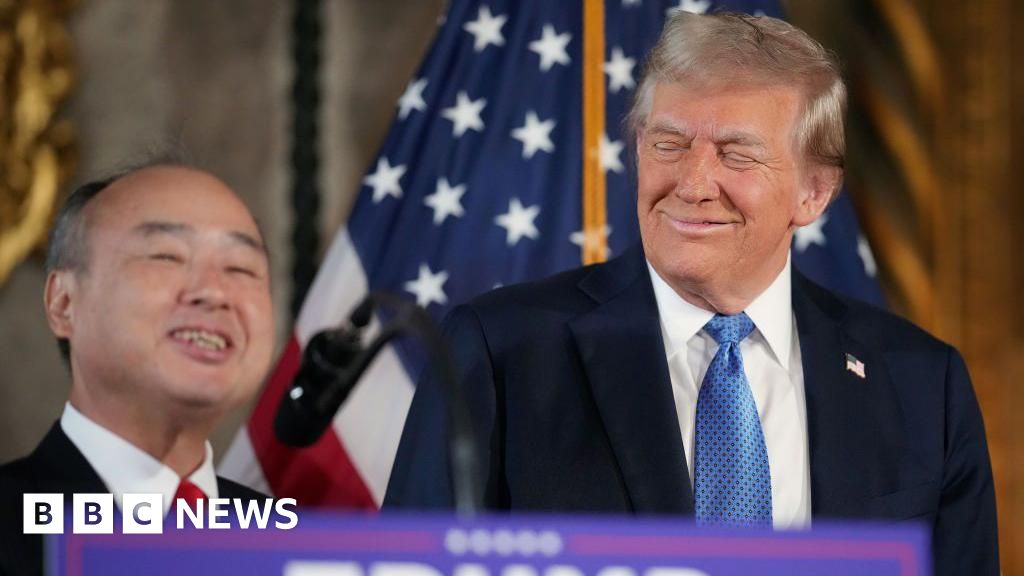With President-elect Donald Trump pitching the US as a great place for business, firms around the world are figuring out how to answer his call.
Japanese tech billionaire Masayoshi Son, a colourful character known as much for his major flops as his big accomplishments, presented one path on Monday, appearing with Trump at a press conference and pledging to invest $100bn (£79bn) over four years and create 100,000 jobs.
“He’s a great negotiator,” the CEO said, laughing on stage as Trump pressed him to double his commitment.
But plenty of questions remain about Mr Son’s venture, especially in light of the lack of details he provided and the record of similar investments during Trump’s first term.
Mr Son has previously discussed the opportunity he sees in artificial intelligence, and Bloomberg reported in February that he was planning a $100bn chip venture.
But his Softbank Group had only about a third of that, $30bn, in cash earlier this year and its global reputation has taken large hits after previous bets, such as a major investment in co-working firm WeWork, imploded.
With the cameras rolling at Mar-a-Lago, Mr Son avoided giving specifics about how he would fund his promise.
Nor did Trump demand details, casting the pledge primarily as a sign of a wider renewal in business optimism, which has been reported in surveys in recent weeks.
“This historic investment is a monumental demonstration of confidence in America’s future,” the president-elect said.
Trump has indicated that when he returns to the White House he plans to use the bully pulpit to court foreign investment.
His campaign promises to slash both taxes and regulations have already boosted Wall Street and charged up big business to pursue large-scale ambitions.
Specifically, Trump has said he would cut taxes for companies that make products in the US and speed approvals for firms investing $1bn or more.
Investors expect him to green-light takeovers and pull back on enforcing antitrust laws, as well.
Still, there are concerns about Trump’s campaign promises to crack down on immigration, which could affect the workforce, and raise tariffs on imports from China, Mexico and Canada. On top of that, he has discussed rolling back manufacturing and energy incentives put in place by President Joe Biden, which some investors like.
Political leaders from both parties often promote business investments and will often take some credit when those ventures boom. President Joe Biden, for example, visited projects by companies such as chipmaker TSMC to highlight historic incentives the government approved for green energy and high-tech firms.
Monday’s event recalled pageantry familiar from Trump’s first term in office, which was punctuated by high-profile announcements of investments. Many of those planned projects had been in the works already or were hazy in their chances of becoming reality.
Those included Taiwanese semiconductor giant Foxconn’s plans to build up a technology park in Wisconsin, which Trump had boasted would become the “eighth wonder of the world”. Instead of creating more than 13,000 jobs and spending more than $10bn, the company created less than 1,000 jobs and spent around $1bn, according to CNBC.
Trump had also said he would save a failed car factory in Lordstown, Ohio, with an electric vehicle start-up backed by Foxconn and had celebrated promises to create a million jobs over five years made by Alibaba’s Jack Ma.
The car company – Lordstown Motors – filed for bankruptcy and reorganized to become Nu Ride Inc earlier this year.
Meanwhile, Alibaba has said it “supported” 403,000 US jobs in 2022, five years after Mr Ma made his promise.
Mr Son’s relationship with Trump also dates back to his first election.
Shortly after Trump took the White House, the two men appeared together to discuss $50bn Mr Son planned to invest in the US, as his firm was evolving into a kind of technology venture-capital firm.
Its current holdings include US telecom firm T-Mobile and UK microchip designer Arm.

